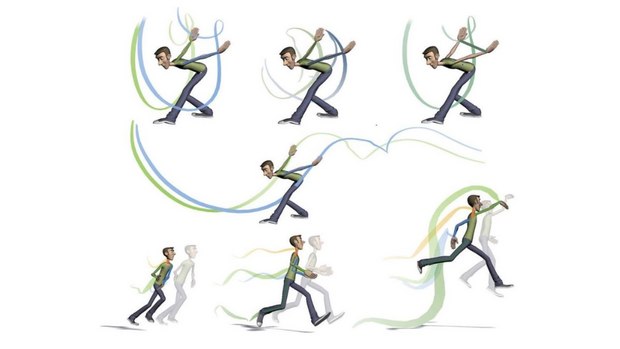Technical papers selected to participate at SIGGRAPH 2016 include an exploration of Shadow Theatre, Virtual Reality mapping techniques, sketch-based motion editing for articulated characters, and more.
SIGGRAPH’s annual Technical Papers program is the premier international forum for disseminating new scholarly work in computer graphics and interactive techniques. As a preview of this year’s upcoming conference, the program trailer is available on the official ACM SIGGRAPH YouTube Channel.
Submissions to the Technical Papers program are received from around the world and feature high quality, never-before-seen scholarly work. Those who submit technical papers are held to extremely high standards in order to qualify. SIGGRAPH 2016 accepted 119 juried technical papers (162 total out of 467 submissions) for this year’s showcase -- an acceptance rate of 25 percent. As per SIGGRAPH tradition, the papers were chosen by a qualified jury comprised of members from academia and industry experts.
“Among the trends we noticed from this year’s submissions was that research in core topics continues while the field itself broadens and matures,” said SIGGRAPH 2016 Technical Papers Program Chair John Snyder. “We saw nine papers on fabrication, and more synergy between topics such as machine learning, perception, and high-level interaction.”
Of the 119 juried papers, the percentage breakdown based on topic area is as follows: 33 percent geometry/modeling; 19 percent image; 14 percent animation; 12 percent rendering; 10 percent physical simulation; 5 percent displays/virtual reality; 5 percent acquisition; and 2 percent interaction.
Highlights from the SIGGRAPH 2016 Technical Papers program include:
Shadow Theatre: Discovering Human Motion from a Sequence of Silhouettes
Jungdam Won and Jehee Lee, Seoul National UniversityShadow theatre is a genre of performance art in which the actors are only visible as shadows projected on the screen. The goal of this study is to generate animated characters whose shadows match a sequence of target silhouettes.
Mapping Virtual and Physical Reality
Qi Sun and Arie Kaufman, Stony Brook University; Li-Yi Wei, University of Hong KongThis work maps a pair of given virtual and real worlds to support real walking in HMD-VR applications via novel 2D mapping and 3D rendering methods.
Flow-Guided Warping for Image-Based Shape Manipulation
Romain Vergne and Georges-Pierre Bonneau, Université Grenoble Alpes Centre national de la recherche scientifique, INRIA; Pascal Barla, INRIA; and, Roland W. Fleming, Justus-Liebig-Universität GießenThis paper presents a method that manipulates perceived object shape from a single input image. It produces the illusion of shape sharpening or rounding by modifying orientation patterns, strongly correlated to surface curvature. The warping algorithm produces convincing shape manipulation results for a variety of materials and lighting environments.
Beyond Developable: Computational Design and Fabrication with Auxetic Materials
Mark Pauly and Mina Konakovic, École polytechnique fédérale de Lausanne (EPFL); Keenan Crane, Carnegie Mellon University; Sofien Bouaziz, Bailin Deng - University of Hull; and, Daniel PikerA computational method for interactive 3D design and rationalization using auxetic material (material that can stretch uniformly up to a certain extent) that allows one to build doubly curved surfaces from flat sheet material.
AutoHair: Fully Automatic Hair Modeling from a Single Image
 Menglei Chai, Tianjia Shao, Hongzhi Wu, Yanlin Weng, and Kun Zhou, Zhejiang University
Menglei Chai, Tianjia Shao, Hongzhi Wu, Yanlin Weng, and Kun Zhou, Zhejiang University
Introducing the first fully automatic method for 3D hair modeling from a single image. The method's efficacy and robustness is demonstrated on internet photos, resulting in a database of 50K 3D hair models and a corresponding hairstyle space that covers a wide range of real-world hairstyles.
SketchiMo: Sketch-Based Motion Editing for Articulated Characters
 Byungkuk Choi, Roger Blanco I. Ribera Korea, Seokpyo Hong, Haegwang Eom, Sunjin Jung, and Junyong Noh, Korea Advanced Institute of Science and Technology; and, J.P. Lewis and Yeongho Seol, Weta Digital Ltd.
Byungkuk Choi, Roger Blanco I. Ribera Korea, Seokpyo Hong, Haegwang Eom, Sunjin Jung, and Junyong Noh, Korea Advanced Institute of Science and Technology; and, J.P. Lewis and Yeongho Seol, Weta Digital Ltd.
A novel sketching interface for expressive editing of motion data through space-time optimization.
The annual SIGGRAPH conference is a five-day interdisciplinary educational experience in the latest computer graphics and interactive techniques, including a three-day commercial exhibition that attracts hundreds of companies from around the world. The conference also hosts the international SIGGRAPH Computer Animation Festival, showcasing works from the world's most innovative and accomplished digital film and video creators. Juried and curated content includes outstanding achievements in time-based art, scientific visualization, visual effects, games, real-time graphics, virtual reality, and narrative shorts. SIGGRAPH 2016 will take place from 24-28 July 2016 in Anaheim, California. Register now for SIGGRAPH 2016, and learn more on the SIGGRAPH 2016 website or follow SIGGRAPH on Facebook, Twitter, YouTube, or Instagram for more detailed information.
The ACM Special Interest Group on Computer Graphics and Interactive Techniques is an interdisciplinary community interested in research, technology, and applications in computer graphics and interactive techniques. Members include researchers, developers, and users from the technical, academic, business, and art communities. ACM SIGGRAPH enriches the computer graphics and interactive techniques community year-round through its conferences, global network of professional and student chapters, publications, and educational activities.
ACM, the Association for Computing Machinery, is the world's largest educational and scientific computing society, uniting educators, researchers, and professionals to inspire dialogue, share resources, and address the field's challenges. ACM strengthens the computing profession's collective voice through strong leadership, promotion of the highest standards, and recognition of technical excellence. ACM supports the professional growth of its members by providing opportunities for lifelong learning, career development, and professional networking.
Source: ACM SIGGRAPH












